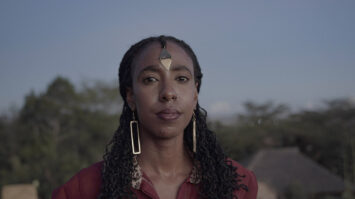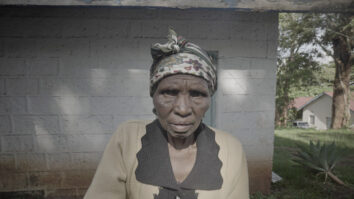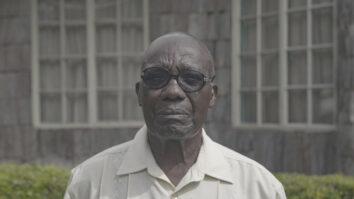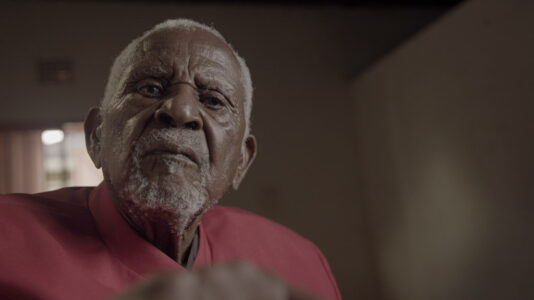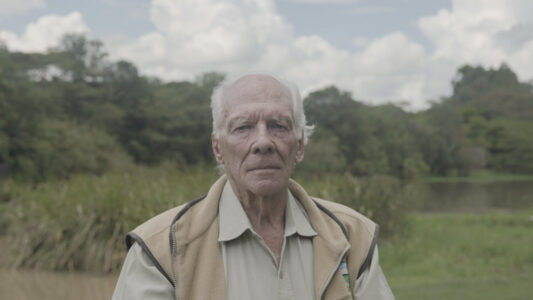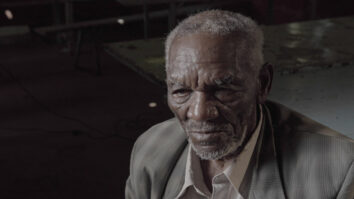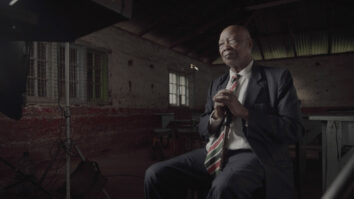★★★★★ Disturbing…paints a bleak and distressing picture of abuses…carried out by colonial forces against the Mau Mau Daily Mail
★★★★ This sobering Channel 4 documentary offered insight & empathy regarding the British colonisation of Kenya. The Telegraph
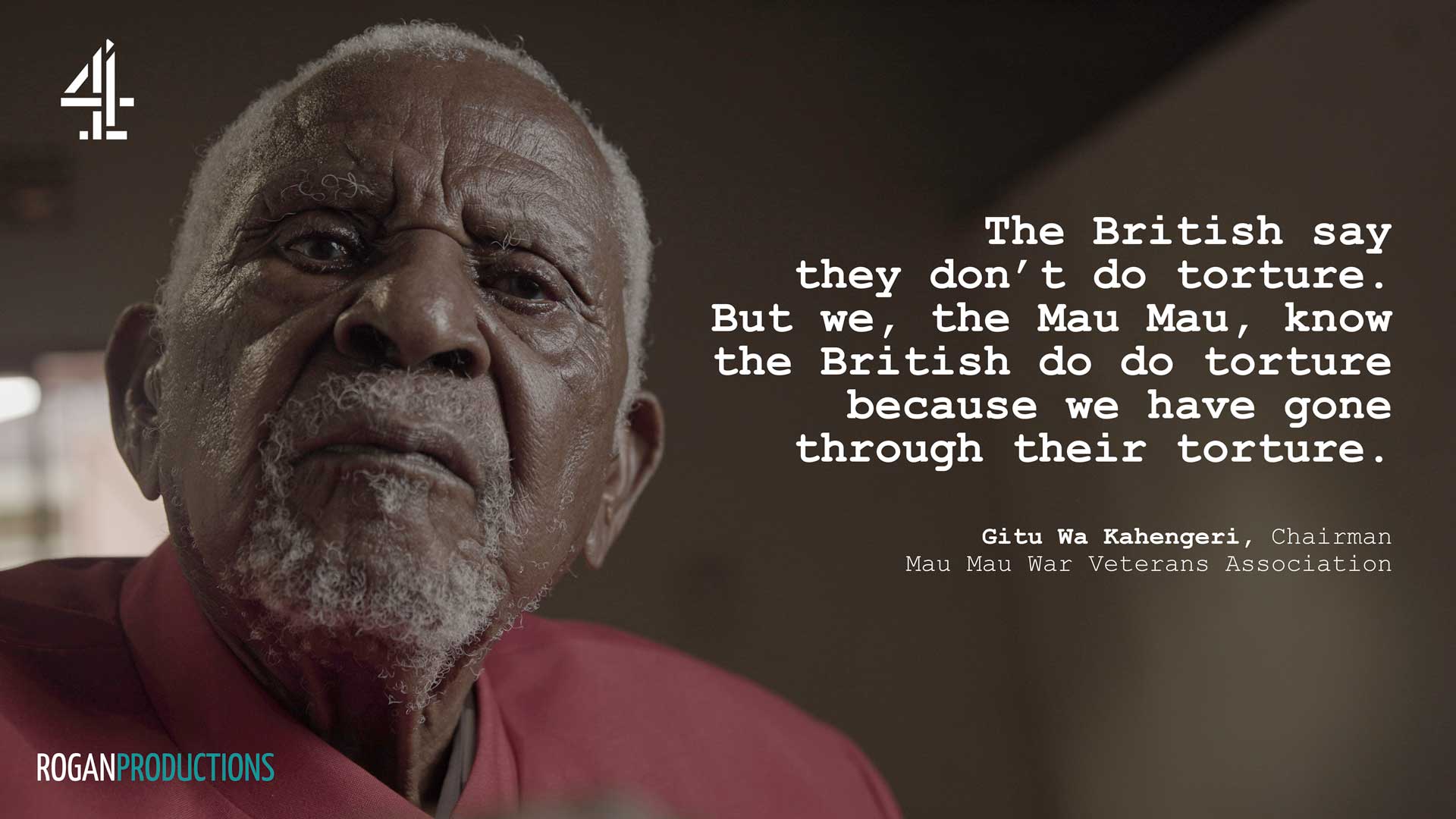
Between 1952 and 1960, Britain fought a vicious war in Kenya against the Mau Mau – a movement fighting for Kenyan independence from colonial rule. It was an exceptionally bloody conflict, with atrocities committed on both sides. For decades, however, many of the worst abuses carried out by British colonial forces have been kept hidden.
Piecing together survivor testimonies and expert analysis from a team of British and Kenyan historians, this film sheds new light on shocking new evidence. Telling a complete story of how Britain was involved in a regime of systematic torture – including accounts of murders, rapes and forced castrations.
Our evidence draws on a previously secret archive known as the ‘Hanslope disclosure’: a cache of over 26,000 files relating to the end of empire that was hidden for over 50 years in a facility used by MI5 and MI6. The files first came to light during a High Court case in 2013 brought by Mau Mau veterans, pleading compensation for torture. When the British government agreed to settle the case for £20 million – avoiding such documents being released in court – only a fraction of the documents had been released. But since then, countless further documents have come to light and now been analysed by historians. A decade later, we can finally tell a comprehensive and harrowing story of British complicity that’s more shocking than anything revealed before.
Rogan Productions drew from this vast archival cache, and A Very British Way of Torture evolved into a powerful and disturbing narrative telling how torture was used in Kenya: its inception; the characters who drove the policy on the ground; how officials were trained in its use; how terrible atrocities were committed; the attempts to expose the abuse by a handful of honourable police officers; and the very British story of Whitehall conspiracy and coverup as the authorities desperately tried to keep the use of torture secret.
The documentary contains a series of revelations:
- In 2013, then Foreign Secretary, William Hague, expressed regret that ‘Kenyans were subject to torture’, yet insisted the liability must lie solely with the ‘colonial administration’, not the British government itself. Yet we reveal how former Colonial Secretary, Alan Lennox-Boyd (who reported directly to Cabinet), had oversight of the ‘Governor’s Complaints Committee’ – a shadowy body in the Kenyan administration that the film shows was one of the chief mechanisms for suppressing allegations of torture.
- A previously secret letter from the Commissioner of Police for Kenya, Arthur Young, reveals the truth behind his resignation and describes how the Kenyan administration explicitly blocked his attempts to expose rapes, murders and acts of torture carried out by colonial forces.
- In 2001, former prison camp administrator, Terence Gavaghan, took part in a now notorious TV interview in which he alleged that ‘not one’ person died in his camp under his leadership. In our film, not only do eyewitness accounts from Mau Mau survivors claim Gavaghan carried out multiple abuses, but we highlight new documents that suggest he knew at the time he was involved in the active torturing of prisoners, which sometimes led to their death.
- The British policy of torture reaches its endgame in the Hola massacre – an atrocity in which 11 detainees were beaten to death in the Hola prison camp. While a contemporary inquiry suggested the atrocity was a one-off, we show that instead it was the inevitable consequence of a deliberate policy of legalised violence.
Our film also questions the established narrative of the end of the British empire. In his famous ‘wind of change’ speech in 1960, Prime Minister, Harold Macmillan, framed decolonisation as the product of a newfound respect for ‘African national consciousness’. Yet the exposure of British torture in Kenya suggests that this paternalistic explanation – Britain ‘letting its children go’ voluntarily – is a misrepresentation. In Kenya, at least, Britain only left after a prolonged period of systematic violence that – once exposed – ultimately undermined the moral legitimacy on which it based its rule.
This may well also be the last time we hear from some of the voices of the surviving Mau Mau war veterans. Finally, we can show how some of their testimony about the British use of torture, for so long disputed by the authorities, is in fact true.
Broadcast details
A Very British Way Of Torture was first broadcast on Channel 4 on Sunday 14th August at 10pm. You can stream it now on All 4.
Al Jazeera have the international broadcast rights to the programme and will be announcing a date soon.
Credits
Director Edward McGown
Producer Robert Newman
Executive Producer Mark Hedgecoe
Articles about the film
Police chief quit after abuse by British colonial troops in Kenya covered up by Aamna Mohdin
Documentary reveals how Britain was not only involved in rape and torture but tried to suppress evidenceread more
A Very British Way of Torture, review: a careful reconstruction of Britain’s colonial atrocities
by Jasper Rees
This sobering Channel 4 documentary offered insight and empathy regarding the British colonisation of Kenya read more

